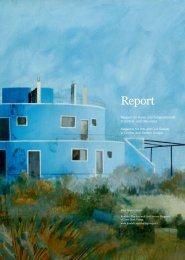Report_Issue 1/2009 - Jubiläum/ 20 Jahre Mauerfall
Report_Issue 1/2009 - Jubiläum/ 20 Jahre Mauerfall
Report_Issue 1/2009 - Jubiläum/ 20 Jahre Mauerfall
Erfolgreiche ePaper selbst erstellen
Machen Sie aus Ihren PDF Publikationen ein blätterbares Flipbook mit unserer einzigartigen Google optimierten e-Paper Software.
Eduard Steiner: What about Europe seen from the Russian point of view?<br />
Fyodor Lukyanov: Generally this view is influenced by a spirit of historical confrontation. When<br />
discussions about about Turkey’s EU membership started I read articles in the Austrian press<br />
about the Turkish sieges. After 50 years of a successful attempt at setting up an entirely new kind<br />
of politics Europe is at a loss about how to develop further. Even seven years ago the European<br />
model was seen an example for the world of the future, even in America. Instead of this we see<br />
remilitarisation, growth in the competition for energy, geopolitically things are coming to a head,<br />
conflicts between religions, the emergence of new powers (China of course, but also Russia, Iran,<br />
Kasachstan). There are new theories about the chances of success of an authoritarian capitalism.<br />
Europe does not wish to and indeed cannot take part in this game, for (with the exception<br />
of Britain and Poland) no one is willing to fight in the Middle East or perhaps even the Far East.<br />
The question remains: is Europe still a model for the future or<br />
an oasis for a historic experiment, which – although successful<br />
– is absolutely unusable in the world at large. In contrast<br />
to the many sceptics I believe that Europe can survive, it is a<br />
robust model.<br />
Is the EU not perhaps the only adequate model of European<br />
integration?<br />
The model is not being questioned, but it has exhausted its<br />
potential. At the moment new countries cannot take over<br />
this model. And Europe cannot take in all who want to join.<br />
Ukraine has made gigantic efforts to break away from the<br />
Russian sphere of influence. The Orange Revolution took place under the buzzword of the European<br />
election. And when democracy won, Europe closed the door. And so the problem began in<br />
Ukraine, which now doesn’t know what direction it should take.<br />
Do you see the closer approach of the neighbouring and the new EU countries towards the USA<br />
as justified?<br />
As far as Poland and the Baltic countries are concerned this has nothing to do with difficulties with<br />
the EU but with the fact that these countries are fixated on the security problem, due to their fear<br />
of Russia. They are completely convinced that only the USA can guarantee their security. They<br />
don’t trust the Europeans, as they feel they have always been betrayed by them and, quite simply,<br />
because they see the state of the EU as regards the military. Nor do they believe in NATO, which<br />
can’t do anything without the USA. Therefore they will use every available means to draw the USA<br />
into European politics.<br />
You say that the elite of the new EU countries differs in mental terms from the old one. Did the<br />
latter neglect to prepare itself?<br />
Western Europe underestimated the influence that the expansion would have on Europe. In <strong>20</strong>03<br />
Europe<br />
has<br />
miscalculated<br />
Russia observes Europe with mixed feelings. As only few Russians have a passport, the impression of Europe goes little further than a diffuse<br />
image. In an interview the political journalist Fyodor Lukyanov describes Europe as an oasis in the international confusion, “a Europe that seals<br />
its external borders and leaves non-EU states to wander around outside seeking membership.” Lukyanov very much doubts whether the map will<br />
look the same in 50 years time.<br />
— Eduard Steiner talks to Fyodor Lukyanov —<br />
people thought: what demands can these countries make, when they are so weak that all of them<br />
together have only the same economic strength as Holland. Europe miscalculated by measuring<br />
everything in terms of the gross national product. There are other things that are far more permanent<br />
and that do not depend on the quality of life. Poland is of course the key country because it is<br />
relatively large and has the psychology of a former major power.<br />
And the ideology is determined by religion?<br />
What else should determine it? Here the social doctrines don’t function. They dont exist. With the<br />
collapse of communism the idea of social justice vanished. As for modern ideas about the order<br />
of society – we haven’t reached that level yet. Religion and traditionalism are not only returning<br />
here, but, in different forms, throughout the world. This is a reaction to globalisation. After pragmatism<br />
and market terminology, follows moralisation.<br />
“The question remains: is Europe still a<br />
model for the future or an oasis for a historic<br />
experiment, which -although successful is<br />
absolutely unusable in the world at large. In<br />
contrast to the many sceptics I believe that<br />
Europe can survive, it is a robust model.”<br />
Is the West still attractive for the Russians?<br />
As regards the standard of living yes and as an example of<br />
correct and efficiently organised states and also as a social<br />
model. However only few understand what the Western<br />
model really means, as unfortunately we are returning to<br />
a traditional matrix of paternalism. And most people don’t<br />
know what the western lifestyle really looks like, as they<br />
don’t have a passport for travel abroad. The traditional Russian<br />
idea is that everything is better in the West. The traditionalist<br />
says that we should not try to imitate, as we cannot<br />
possibly succeed. But now the dominant feeling is that we are self-sufficient, that we know and can<br />
do everything ourselves and need nothing else.<br />
Fyodor Lukyanov has been editor-in-chief of the political magazine “Russia in Global Affairs” that appears in Russian<br />
(every two months) and in English (every four months) since <strong>20</strong>02. He studied German and simultaneous<br />
translation and at the beginning of the 1990s worked for the international Moscow radio station “Die Stimme<br />
Russlands” (The Voice of Russia). From 1994 to 1997 he was correspondent at the international desk of the newspaper<br />
“ Segodnya”, from 1997 to <strong>20</strong>00 of the newspaper “Wremja MN”. From <strong>20</strong>00 to <strong>20</strong>02 he was deputy editorin-chief<br />
of the newspaper “Wremya Nowostei”. Lukyanov speaks German, Swedish and English.<br />
The journal “Russia in Global Affairs” was founded jointly by the council for foreign affairs and defence policy, the<br />
Russian industrialists and entrepreneurs association, and the daily newspaper “Izvestiya”.<br />
The interview was held by Eduard Steiner, correspondent of “Die Presse” in Moscow. The unabridged interview was<br />
published in „<strong>Report</strong>“ 2/<strong>20</strong>07.<br />
7




